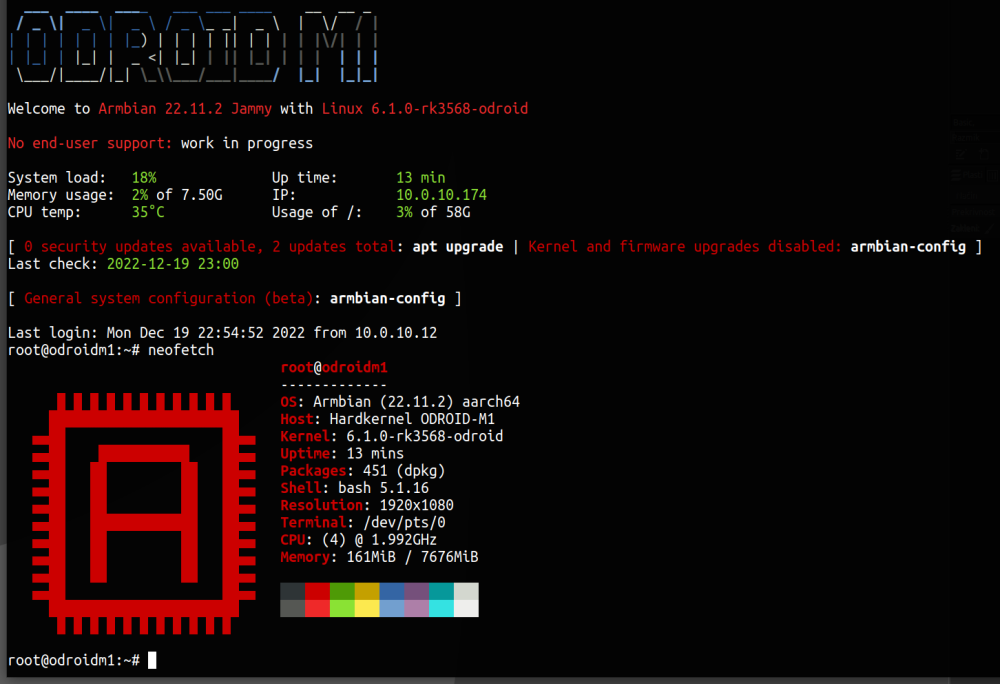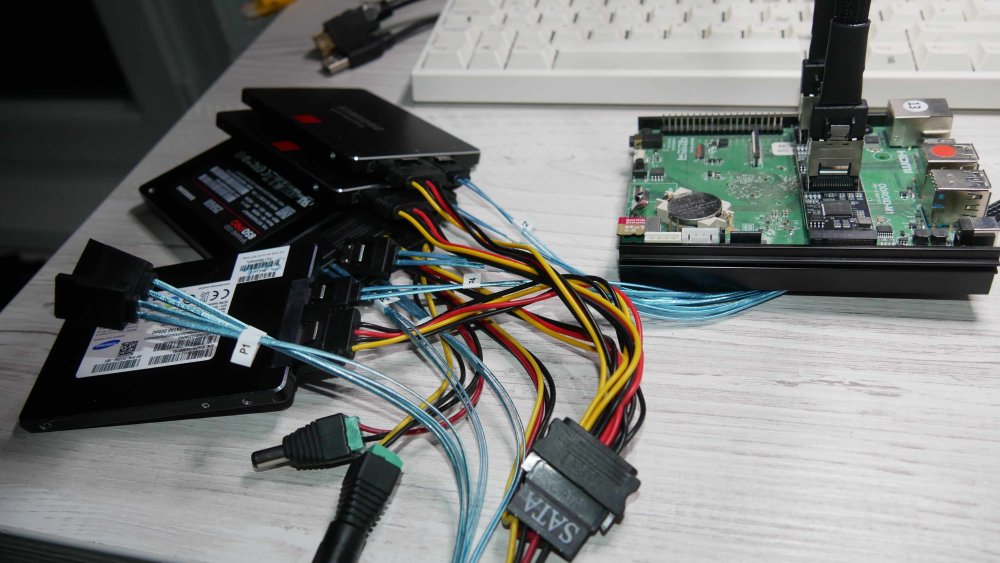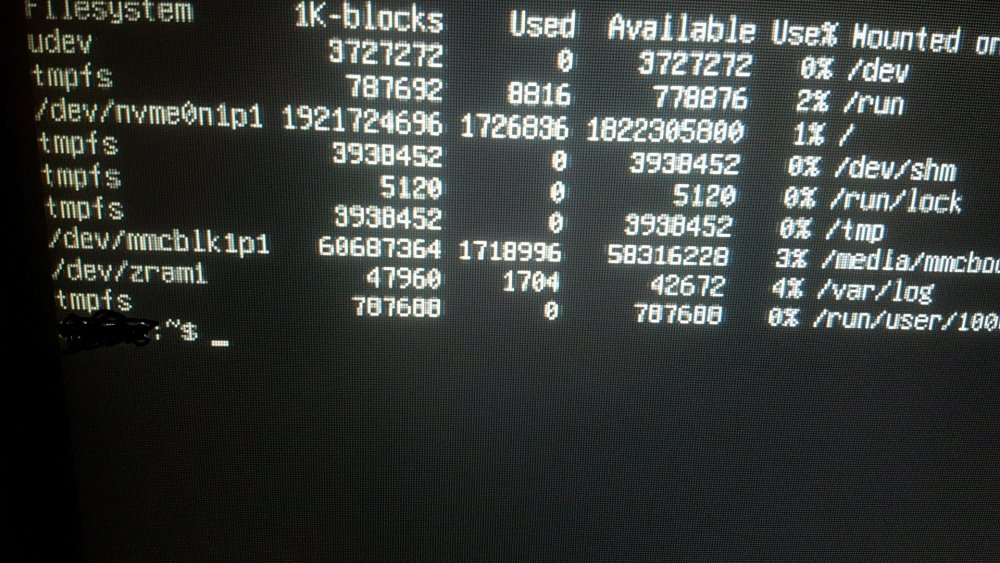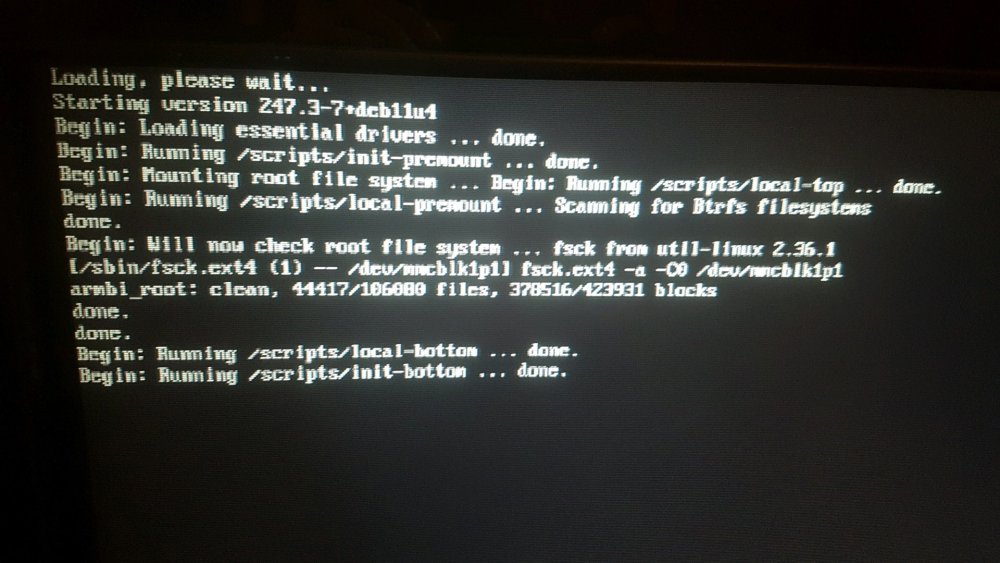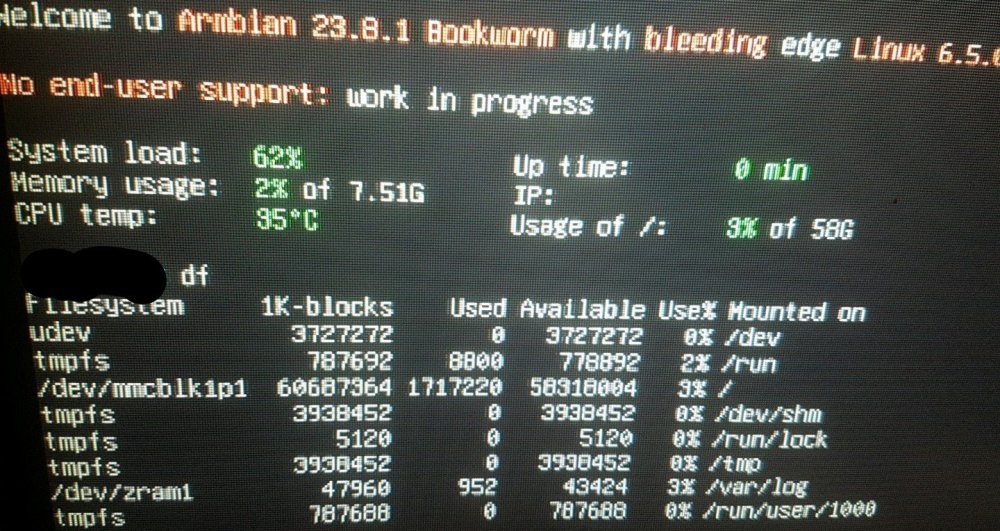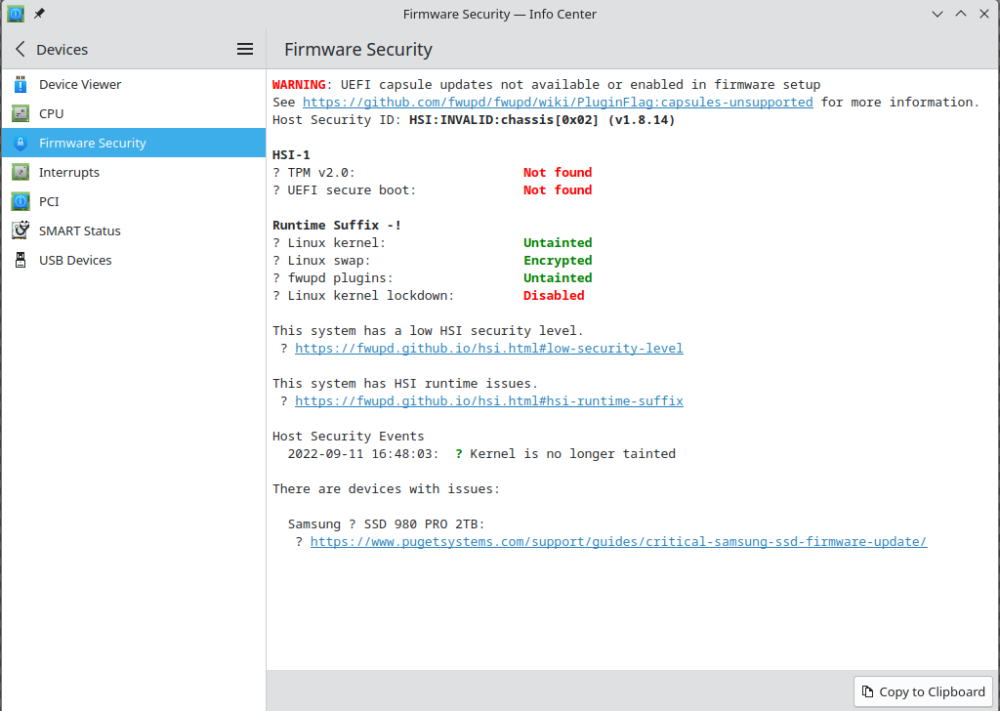Search the Community
Showing results for tags 'odroidm1'.
-
When the ODROID-M1 is setup to boot from SPI with the system installed on a M2 ssd, power loss seems to lead to an unbootable system. Once an SD card with armbian is inserted and the system is booted through the recovery button once, logged in* and then shutdown normally, the system boots again from SPI. * Without login and regular shutdown of the system booted from sd card, the issue remains I have observed and reproduced this issue several times in the last year. In my case the M1 is connected to a power strip that turns on and off the multiple devices. When I forget to unplug the M1 and it gets turned on and off several times over a day or more, the issue appears. When I turn it of manually I could not yet observe the issue, so it may be related to being booted and turned off multiple times in short order. When I investigate the journal of the last boot circles, there is nothing there, as if the boot process never started, leaving me to suspect an issue with the bootloader in combination with SPI and power loss.
-
Hi, I wanted to give my Odroid M1 new life by installing a fresh Armbian 25.5.1. Previously it was running on an old Odroid Ubuntu Image. After starting from SD I have no ethernet connection. The eth0 interface is DOWN. I tried using a USB3 2.5G ethernet adapter, but the new network interface also shows DOWN. I have tried Debian and Ubuntu Minimal images with the same results. What could be the cause and how do I get a working ethernet connection? Thanks Malz
-
Hi, just installed 23.8.1 on my odroid M1, and I get poor network perf when using 1G port speed. iperf to another machine (iperf -c <server>, M1 sends traffic) gives the following: [ID] Interval Transfer Bitrate Retr [ 5] 0.00-10.00 sec 8.15 MBytes 6.84 Mbits/sec 631 sender [ 5] 0.00-10.04 sec 7.86 MBytes 6.57 Mbits/sec receiver reverse direction, M1 receives traffic: iperf -R -c <server> [ ID] Interval Transfer Bitrate Retr [ 5] 0.00-10.04 sec 1.10 GBytes 937 Mbits/sec 587 sender [ 5] 0.00-10.00 sec 1.09 GBytes 938 Mbits/sec receiver same exists with older releases. also tried with older kernel (6.1.12-rk3568-odroid) when I set the network port on switch side to 100Mbps / full, then send, receive side is ok, can fill 100Mbps. Can you please help? BR, Tamas
-
Dear all, I have recently acquired an ODROID M1 board and flashed Armbian 24.5.3 on it to replace my old XU4 running Armbian 24.5.1. I've managed to port everything from the old XU4 to the new M1 except for two WiFi dongles. They worked just fine on the XU4 but the M1 just doesn't want to recognize them, I can see them when I run `lsusb` Bus 008 Device 001: ID 1d6b:0001 Linux Foundation 1.1 root hub Bus 007 Device 001: ID 1d6b:0002 Linux Foundation 2.0 root hub Bus 006 Device 001: ID 1d6b:0001 Linux Foundation 1.1 root hub Bus 005 Device 002: ID 0bda:0811 Realtek Semiconductor Corp. Realtek 8812AU/8821AU 802.11ac WLAN Adapter [USB Wireless Dual-Band Adapter 2.4/5Ghz] Bus 005 Device 001: ID 1d6b:0002 Linux Foundation 2.0 root hub Bus 004 Device 001: ID 1d6b:0003 Linux Foundation 3.0 root hub Bus 003 Device 001: ID 1d6b:0002 Linux Foundation 2.0 root hub Bus 002 Device 001: ID 1d6b:0003 Linux Foundation 3.0 root hub Bus 001 Device 002: ID 0bda:8812 Realtek Semiconductor Corp. RTL8812AU 802.11a/b/g/n/ac 2T2R DB WLAN Adapter Bus 001 Device 001: ID 1d6b:0002 Linux Foundation 2.0 root hub but I get no wifi interfaces. Does anybody know what the problem could be? Thanks in advance!
-
Hello, sorry for the tag (no odroid m1 tag) and if I'm in the wrong place. I downloaded the image Armbian_24.8.3_ordoidm1_jammy_current_6.6.51_kde-neon-kisak-desktop The image does not start without pressing rcy, so far normal. After flashing the mtd with armbian-installer and copying to SSD. The image still does not start. No display. After trying several things and without success, I decided to try an old image: Armbian_24.2.1_ordoidm1_jammy_current_6.6.16_xfce_desktop. I here rcy boot, install, copy to SSD, flash mtd and reboot. And it works. So I tried image 6.6.51 kde Again. But without flashing the mtd. And there it boots without problems and no need for rcy. So it seems that the last image and also the 24.2. 4 that I tried. We have a probably corrupted uboot. I have the odroid m1 8gb. I hope this will allow others not to waste hours trying because of a corrupted uboot. (This was my first attempt with armbian on this card. Before I had petitboot.) Sorry for my bad English. I used Google translate. PS: I tried to make a bug report form. But you have to provide an armbianmonitor -u output or something like that. And that doesn't match the fact. The card doesn't even boot.
-
On my Odroid M1 which used to run kernel 6.6.63 / armbian 24.11.3 noble from NVME, an update to kernel 6.12.9 arrived this morning. Afterwards the machine failed to detect an external USB disk. There are some messages in the logs of the 6.12.9 boot that look suspicious to me: [ 2.670354] rockchip-naneng-combphy fe820000.phy: error -ENOENT: failed to get phy reset [ 2.670392] rockchip-naneng-combphy fe820000.phy: probe with driver rockchip-naneng-combphy failed with error -2 [ 20.458737] platform fc800000.sata: deferred probe pending: platform: supplier fe840000.phy not ready [ 20.458786] platform fcc00000.usb: deferred probe pending: platform: supplier fe820000.phy not ready [ 20.458812] platform fd000000.usb: deferred probe pending: platform: supplier fe830000.phy not ready The USB disk shows up as "ID 2537:1066 Norelsys NS1066" on the USB bus with the 6.6.63 kernel, no trace of its USB ID shows up with the newer kernel. The ID coincides with the ones contained in the kernel command line: usbstoragequirks=0x2537:0x1066:u,0x2537:0x1068:u Does anybody know how to get the USB disk working with that newer kernel? I downgraded to 6.6.63 for now. Regards Mathias 6.6.63-armbian-hardware-monitor.log 6.12.9-armbian-hardware-monitor.log
-
Hi! I am looking into OdroidM1 network performance with kernel 6.6.47-current-rockchip64 ( 24.8.1 ) For some reason network performance is x10 faster (upstream) in bookworm and noble, when compared to jammy. Downstream performance is fine, delivering the same performance in jammy and the other distributions. Since all of them are using the same kernel, I assume that there must be some configuration that jammy is missing, or? Any idea about what could be going on?
-
-
Hi, How can i get the Rknpu working in Armbian for latest builds. I am unable to find how to make this work. Thanks in Anticipation
-
Hello, After successfully installed and booted Armbian 23.02.2 Jammy from SD card on Odroid M1, I ran armbian-install script with using option "boot from SD, system on SSD" to move system to SSD. The process finished successfully, see the logs from armbianmonitor (taken before reboot): https://paste.armbian.com/folivedane After reboot, system failed to boot automatically from SSD due to error: [ 13.766854] 8644d43f-c78d-4586-ab61-14dfa2e740ea: Can't open blockdev [ 13.774855] systemd[1]: Starting Rule-based Manager for Device Events and Files... [ 13.781860] systemd[1]: media-mmcboot.mount: Mount process exited, code=exited, status=32/n/a [ 13.781889] systemd[1]: media-mmcboot.mount: Failed with result 'exit-code'. [ 13.783141] systemd[1]: Failed to mount /media/mmcboot. [ 13.785392] systemd[1]: Dependency failed for /boot. It asked for root password to go to maintenance mode. I found, boot failed because of wrong entry in /etc/fstab: root@odroidm1:~# cat /etc/fstab # <file system> <mount point> <type> <options> <dump> <pass> tmpfs /tmp tmpfs defaults,nosuid 0 0 8644d43f-c78d-4586-ab61-14dfa2e740ea /media/mmcboot ext4 defaults,noatime,commit=600,errors=remount-ro,x-gvfs-hide 0 1 /media/mmcboot/boot /boot none bind 0 0 UUID=832c2ac5-7666-4725-a85f-c8a015d9995a / ext4 defaults,noatime,commit=600,errors=remount-ro,x-gvfs-hide 0 1 as you can see there is missing "UUID=" before uuid string for /media/mmcboot entry. After I fixed this problem by mounting /media/mmcboot and /boot (bind mount) manually and exited from maintenance mode it booted OK. I collected another armbianmonitor logs after boot, see: https://paste.armbian.com/qohidenowu When the broken line is fixed in the /etc/fstab: UUID=8644d43f-c78d-4586-ab61-14dfa2e740ea /media/mmcboot ext4 defaults,noatime,commit=600,errors=remount-ro,x-gvfs-hide 0 1 system is booting normally. The same issue is present also when I used image Armbian 23.02.2 Bullseye Could you fix this bug, please? I think problem in nand-sata-install script (line 371). Thanks in advance!
-
HI!! I need help. What is the correct way to install armbian? I have an odroid m1, with a nvme 2 TB. I installed armbian and also stored my files on the same disk. The problem is that one day I updated the system and also updated the kernel. This caused the system no longer boot. I tried to fix the file system but it is still corrupt. The problem is that the nvme where I have all my files is not accessible and therefore I cannot copy them to another drive. When I mount the nvme drive (with external case) on my laptop with Ubuntu, the files do not appear. Therefore, I would like to know if where is the best option to install armbian and and mantaining safe mu files. In the future I want to use the sata port to add another disk, so I couldn't install armbian there either. Do you recommend installing a USB3 pendrive and installing Armbian there? Is it very slow that way? The other thing, how can I recover my nmve data? Thank you very much for the help
-
Im running Armbian 24.2.1 jammy on odroidm1 with additional zfs volumes. On update, sometimes I had to reinstall the zfs kernel module, but now I have the problem, that the system does not recognize the kernel headers: sudo apt-get --reinstall install zfs-dkms Reading package lists... Done Building dependency tree... Done Reading state information... Done 0 upgraded, 0 newly installed, 1 reinstalled, 0 to remove and 0 not upgraded. Need to get 2,397 kB of archives. After this operation, 0 B of additional disk space will be used. Get:1 http://mirrors.dotsrc.org/armbian-apt jammy/jammy-utils arm64 zfs-dkms all 2.2.3-1 [2,397 kB] Fetched 2,397 kB in 1s (3,567 kB/s) Preconfiguring packages ... (Reading database ... 72929 files and directories currently installed.) Preparing to unpack .../zfs-dkms_2.2.3-1_all.deb ... Deleting module zfs-2.2.3 completely from the DKMS tree. Unpacking zfs-dkms (2.2.3-1) over (2.2.3-1) ... Setting up zfs-dkms (2.2.3-1) ... Loading new zfs-2.2.3 DKMS files... Building for 6.1.12-rk3568-odroid Module build for kernel 6.1.12-rk3568-odroid was skipped since the kernel headers for this kernel does not seem to be installed. Processing triggers for initramfs-tools (0.140ubuntu13.4) ... update-initramfs: Generating /boot/initrd.img-6.1.12-rk3568-odroid W: Possible missing firmware /lib/firmware/nvidia/tegra194/xusb.bin for built-in driver xhci_tegra W: Possible missing firmware /lib/firmware/nvidia/tegra186/xusb.bin for built-in driver xhci_tegra W: Possible missing firmware /lib/firmware/nvidia/tegra210/xusb.bin for built-in driver xhci_tegra W: Possible missing firmware /lib/firmware/nvidia/tegra124/xusb.bin for built-in driver xhci_tegra update-initramfs: Armbian: Converting to u-boot format: /boot/uInitrd-6.1.12-rk3568-odroid Image Name: uInitrd Created: Thu Apr 25 11:27:48 2024 Image Type: AArch64 Linux RAMDisk Image (gzip compressed) Data Size: 27753116 Bytes = 27102.65 KiB = 26.47 MiB Load Address: 00000000 Entry Point: 00000000 update-initramfs: Armbian: Symlinking /boot/uInitrd-6.1.12-rk3568-odroid to /boot/uInitrd '/boot/uInitrd' -> 'uInitrd-6.1.12-rk3568-odroid' update-initramfs: Armbian: done. I already removed and reinstalled the headers via armbian-config > Headers_remove, Headers_install but without change. apt-get list --installed |grep header linux-headers-edge-rockchip64/jammy,now 24.2.1 arm64 [installed] do I need to create some magic symlinks or parameters for apt-get to get the headers resolved since the kernel version is missing in the package?
-
Members, I have a question, because I can't find any documentation about what is broken or not. Why does /dev/rga not exist in my armbian install? I need it for my FFmpeg rkmpp config.
-
I recently make functionning the I2C-0 port on odroid M1 (thanks to usual user) see topic [odroid m1 i2c not detecting external device]. But I have another problem the tty1 display on the oled screen when I disconnect the HDMI. Where can i disabled this ?
-
This is my config : Odroid M1 (8G) with Armbian 6.6.0-rc6-edge-rk3568-odroid build myself. >root@yanas3:/dev# i2cdetect -l >i2c-3 i2c rk3x-i2c I2C adapter >i2c-6 i2c DesignWare HDMI I2C adapter >root@yanas3:/dev# i2cdetect -y 3 > 0 1 2 3 4 5 6 7 8 9 a b c d e f >00: -- -- -- -- -- -- -- -- >10: -- -- -- -- -- -- -- -- -- -- -- -- UU -- -- -- >20: UU -- -- -- -- -- -- -- -- -- -- -- -- -- -- -- >30: -- -- -- -- -- -- -- -- -- -- -- -- -- -- -- -- >40: -- -- -- -- -- -- -- -- -- -- -- -- -- -- -- -- >50: -- -- -- -- -- -- -- -- -- -- -- -- -- -- -- -- >60: -- -- -- -- -- -- -- -- -- -- -- -- -- -- -- -- >70: -- -- -- -- -- -- -- -- My peripheral is an OLED screen SSD1306. It works perfectly with an Orange Pi5. It's connected to GPIO pin 1 (VDD), 3 (SDA),5 (SDL),9 (GND) but I can't see it. What am i doing wrong ?
-
Hi guys ! So far I tested building bullseye without luck and the bookworm release img Building bullseye and burn it to an sd card system will not boot even after pressing the RCY button. I've build today a new img and it boots bullseye but it freezes loading first boot With bookworm it does boot pressing the RCY button but the Boot from MTD flash and system to nvme seems broken if power off the board remove the sd card the system won't boot with or without sd card (If I boot it again using the RCY with the installer already configured on the sd card and use the command df the nvme disk is not present but it appears in the installation) (Pic 4) Also on bookworm booting from sd card and installing system to nvme works without issues The nvme it's a 2TB 970 evo plus which according to hardkernel is compatible and it is since the boot from sd is working without issues I've notice a blazing fast line while using the MTD Thanks !
-
The problem persist on both Armbian 23.8 bullseye and Armbian 23.11.0-trunk.107 Bullseye After change it via armbian-config It stays the default cpufreq-info cpufrequtils 008: cpufreq-info (C) Dominik Brodowski 2004-2009 Report errors and bugs to cpufreq@vger.kernel.org, please. analyzing CPU 0: driver: cpufreq-dt CPUs which run at the same hardware frequency: 0 1 2 3 CPUs which need to have their frequency coordinated by software: 0 1 2 3 maximum transition latency: 149 us. hardware limits: 408 MHz - 1.99 GHz available frequency steps: 408 MHz, 600 MHz, 816 MHz, 1.10 GHz, 1.42 GHz, 1.61 GHz, 1.80 GHz, 1.99 GHz available cpufreq governors: conservative, ondemand, userspace, powersave, performance, schedutil current policy: frequency should be within 408 MHz and 1.99 GHz. The governor "ondemand" may decide which speed to use within this range. current CPU frequency is 1.99 GHz (asserted by call to hardware). cpufreq stats: 408 MHz:0.86%, 600 MHz:9.43%, 816 MHz:3.66%, 1.10 GHz:0.00%, 1.42 GHz:0.00%, 1.61 GHz:0.00%, 1.80 GHz:0.00%, 1.99 GHz:86.04% (10441) analyzing CPU 1: driver: cpufreq-dt CPUs which run at the same hardware frequency: 0 1 2 3 CPUs which need to have their frequency coordinated by software: 0 1 2 3 maximum transition latency: 149 us. hardware limits: 408 MHz - 1.99 GHz available frequency steps: 408 MHz, 600 MHz, 816 MHz, 1.10 GHz, 1.42 GHz, 1.61 GHz, 1.80 GHz, 1.99 GHz available cpufreq governors: conservative, ondemand, userspace, powersave, performance, schedutil current policy: frequency should be within 408 MHz and 1.99 GHz. The governor "ondemand" may decide which speed to use within this range. current CPU frequency is 1.99 GHz (asserted by call to hardware). cpufreq stats: 408 MHz:0.86%, 600 MHz:9.43%, 816 MHz:3.66%, 1.10 GHz:0.00%, 1.42 GHz:0.00%, 1.61 GHz:0.00%, 1.80 GHz:0.00%, 1.99 GHz:86.04% (10441) analyzing CPU 2: driver: cpufreq-dt CPUs which run at the same hardware frequency: 0 1 2 3 CPUs which need to have their frequency coordinated by software: 0 1 2 3 maximum transition latency: 149 us. hardware limits: 408 MHz - 1.99 GHz available frequency steps: 408 MHz, 600 MHz, 816 MHz, 1.10 GHz, 1.42 GHz, 1.61 GHz, 1.80 GHz, 1.99 GHz available cpufreq governors: conservative, ondemand, userspace, powersave, performance, schedutil current policy: frequency should be within 408 MHz and 1.99 GHz. The governor "ondemand" may decide which speed to use within this range. current CPU frequency is 1.99 GHz (asserted by call to hardware). cpufreq stats: 408 MHz:0.86%, 600 MHz:9.43%, 816 MHz:3.66%, 1.10 GHz:0.00%, 1.42 GHz:0.00%, 1.61 GHz:0.00%, 1.80 GHz:0.00%, 1.99 GHz:86.04% (10441) analyzing CPU 3: driver: cpufreq-dt CPUs which run at the same hardware frequency: 0 1 2 3 CPUs which need to have their frequency coordinated by software: 0 1 2 3 maximum transition latency: 149 us. hardware limits: 408 MHz - 1.99 GHz available frequency steps: 408 MHz, 600 MHz, 816 MHz, 1.10 GHz, 1.42 GHz, 1.61 GHz, 1.80 GHz, 1.99 GHz available cpufreq governors: conservative, ondemand, userspace, powersave, performance, schedutil current policy: frequency should be within 408 MHz and 1.99 GHz. The governor "ondemand" may decide which speed to use within this range. current CPU frequency is 1.99 GHz (asserted by call to hardware). cpufreq stats: 408 MHz:0.86%, 600 MHz:9.43%, 816 MHz:3.66%, 1.10 GHz:0.00%, 1.42 GHz:0.00%, 1.61 GHz:0.00%, 1.80 GHz:0.00%, 1.99 GHz:86.04% (10441)
-
Hello Everyone, As I am still working on hardening my Odroid-M1 servers, I am looking for a solution to activate a real console for root login only. My homelab is not in the same room as my desk, so I need to get access from an internal VLAN with restrictions and take control even if the network drivers are not enabled. Have you tested or used a UART to Ethernet converter like https://www.pusr.com/products/ethernet-to-uart-modules-usr-k7.html or https://www.waveshare.com/uart-to-eth.htm or something else? Let me know your thoughts. Sincerely, Frederic
-
Hello everyone, I'm a newcomer to ARMBIAN, and I'm eager to transition from my current stock Odroid (20.04) setup (petitboot full nvme SSD) to a more up-to-date distribution, complete with the latest kernel upgrades. I've taken the time to go through the documentation and here's what I've gathered: It appears that native booting from an nvme SSD or USB isn't possible (yet?). Instead, I'll need to use microSD cards or an emmc module for booting while installing the system on an nvme SSD. I also understand that deactivating petitboot is necessary. Now, I have a few questions: Q1: Do I have a correct understanding of these two prerequisites, or is there any way to retain petitboot functionality? Additionally, can I install both the boot and system on the nvme SSD, bypassing the emmc altogether? Q2: Given that I require both USB ports to operate at 5Gb/s, it seems that emmc is my best choice. Could you recommend a specific emmc in terms of size or brand that aligns with my needs? Q3: In my work with production servers, I frequently employ LVM for storage encapsulation. At home, on my NUC (10i7FNH) with Ubuntu 22.04, I've placed /boot outside the LVM volume, while other filesystems perform well when managed by LVM. Is it feasible to replicate this setup with ARMBIAN during installation, encapsulating / within an LVM volume? Q4: As my 3 odroid-M1 systems will be dedicated to running technical services for POCs or homelab (server + CLI only), I'm interested in having KVM installed. Is this a possibility on ARMBIAN, and could you guide me through the process of creating virtual machines within the ARMBIAN environment? Appreciating your assistance, I don't know if I am using the right location to post this message, please tell me where to post it if I was wrong. Frederic
-
Hello, thanks for supporting this device I'm trying to install pivccu (homematic smarthome) on armbian to use it with homeassistant. It's not officially supported (yet) but I got it running with the default hardkernel ubuntu image. https://github.com/alexreinert/piVCCU/blob/master/docs/setup/armbian.md I can't seem to find the kernel headers/sources for my kernel. Any Ideas? Below is what I found. I'm willing to go back to 6.1.12 if that doesn't cause any issues. Can't do it via armbian-config. Do I need to download an image from the archive and reinstall? uname -a Linux odroid 6.3.4-rk3568-odroid #5 SMP PREEMPT Wed May 24 16:30:25 UTC 2023 aarch64 GNU/Linux ----------------------------------------------- apt search $(uname -r) Sorting... Done Full Text Search... Done linux-dtb-edge-rk3568-odroid/now 23.05.1--6.3.4-S17f2-Db165-P80b4-C323dHfe66-HK01ba-Vc222-B9c18 arm64 [installed,local] Armbian Linux edge DTBs version "6.3.4" git revision "17f2d782f18c9a49943ea723d7628da1837c9204" codename "Hurr durr Ima ninja sloth" drivers hash "b165677e9cfc7376" patches hash "80b43c0ea45182e1" .config hash "323dfc8836b51fe8" .config hook hash "fe661159ee64825e" variables hash "" framework bash hash "9c188aa4807ed506" in /boot/dtb-6.3.4-rk3568-odroid linux-image-edge-rk3568-odroid/now 23.05.1--6.3.4-S17f2-Db165-P80b4-C323dHfe66-HK01ba-Vc222-B9c18 arm64 [installed,local] Armbian Linux edge kernel image version "6.3.4" git revision "17f2d782f18c9a49943ea723d7628da1837c9204" codename "Hurr durr Ima ninja sloth" drivers hash "b165677e9cfc7376" patches hash "80b43c0ea45182e1" .config hash "323dfc8836b51fe8" .config hook hash "fe661159ee64825e" variables hash "" framework bash hash "9c188aa4807ed506" ----------------------------------------------- apt search rk3568 Sorting... Done Full Text Search... Done linux-dtb-edge-rk3568-odroid/now 23.05.1--6.3.4-S17f2-Db165-P80b4-C323dHfe66-HK01ba-Vc222-B9c18 arm64 [installed,local] Armbian Linux edge DTBs version "6.3.4" git revision "17f2d782f18c9a49943ea723d7628da1837c9204" codename "Hurr durr Ima ninja sloth" drivers hash "b165677e9cfc7376" patches hash "80b43c0ea45182e1" .config hash "323dfc8836b51fe8" .config hook hash "fe661159ee64825e" variables hash "" framework bash hash "9c188aa4807ed506" in /boot/dtb-6.3.4-rk3568-odroid linux-headers-edge-rk3568-odroid/bookworm,now 23.02.2 arm64 [installed] Linux kernel headers for 6.1.12-rk3568-odroid on arm64 edge linux-image-edge-rk3568-odroid/now 23.05.1--6.3.4-S17f2-Db165-P80b4-C323dHfe66-HK01ba-Vc222-B9c18 arm64 [installed,local] Armbian Linux edge kernel image version "6.3.4" git revision "17f2d782f18c9a49943ea723d7628da1837c9204" codename "Hurr durr Ima ninja sloth" drivers hash "b165677e9cfc7376" patches hash "80b43c0ea45182e1" .config hash "323dfc8836b51fe8" .config hook hash "fe661159ee64825e" variables hash "" framework bash hash "9c188aa4807ed506" linux-source-6.1.12-edge-rk3568-odroid/bookworm,bookworm 6.1.12-edge-rk3568-odroid+23.02.2 all This package provides the source code for the Linux kernel 6.1.12 ----------------------------------------------- ls -lah /usr/src/ total 28K drwxr-xr-x 7 root root 4,0K Aug 14 09:35 . drwxr-xr-x 11 root root 4,0K Mai 17 00:41 .. drwxr-xr-x 4 root root 4,0K Aug 12 13:11 linux-headers-6.1.0-11-arm64 drwxr-xr-x 4 root root 4,0K Aug 12 13:10 linux-headers-6.1.0-11-common drwxr-xr-x 25 root root 4,0K Aug 14 08:04 linux-headers-6.1.12-rk3568-odroid lrwxrwxrwx 1 root root 23 Aug 8 13:18 linux-kbuild-6.1 -> ../lib/linux-kbuild-6.1 drwxrwxr-x 27 root root 4,0K Feb 18 00:33 linux-source-6.1.12-rk3568-odroid drwxr-xr-x 2 root root 4,0K Aug 12 13:11 pivccu-1.0.82
-
/root/RTL8811CU/os_dep/osdep_service.c: In function ‘rtw_change_ifname’: /root/RTL8811CU/os_dep/osdep_service.c:2494:28: warning: passing argument 1 of ‘_rtw_memcpy’ discards ‘const’ qualifier from pointer target type [-Wdiscarded-qualifiers] 2494 | _rtw_memcpy(pnetdev->dev_addr, adapter_mac_addr(padapter), ETH_ALEN); | ~~~~~~~^~~~~~~~~~ /root/RTL8811CU/os_dep/osdep_service.c:925:24: note: expected ‘void *’ but argument is of type ‘const unsigned char *’ 925 | void _rtw_memcpy(void *dst, const void *src, u32 sz) | ~~~~~~^~~ /root/RTL8811CU/os_dep/osdep_service.c: In function ‘rtw_random32’: /root/RTL8811CU/os_dep/osdep_service.c:2618:16: error: implicit declaration of function ‘prandom_u32’; did you mean ‘get_random_u32’? [-Werror=implicit-function-declaration] 2618 | return prandom_u32(); | ^~~~~~~~~~~ | get_random_u32 cc1: some warnings being treated as errors make[2]: *** [/usr/src/linux-headers-6.3.0-kali1-common/scripts/Makefile.build:257: /root/RTL8811CU/os_dep/osdep_service.o] Ошибка 1 make[1]: *** [/usr/src/linux-headers-6.3.0-kali1-common/Makefile:2050: /root/RTL8811CU] Ошибка 2 make[1]: выход из каталога «/usr/src/linux-headers-6.3.0-kali1-amd64» make: *** [Makefile:2217: modules] Ошибка 2
-
On my Odroid M1 I have a display that will not work, other displays do work. Unfortunately, I need this display to work. When I plug it in, I see "PHY PLL not locked" in dmesg. If I boot with it plugged in, I see the Hard Kernel logo, then the screen turns off as Armbian boots. I booted into the Ubuntu 20.04 Gnome image provided by HardKernel and that one works. 1. What could I change to allow this display to be detected? 2. Can I just force the board to boot with output to 1024x768@60. I just need the output. Thanks all.
-
While exploring my Info Center, I stumbled across this screen: If there are other users who use a Samsung SSD 980 PRO 2TB, they may also be interested in following this link: https://www.pugetsystems.com/support/guides/critical-samsung-ssd-firmware-update/
-
Sorry, if this is not odroid specific but I don't know if this issue is a armbian generic one: I guess also in armbian running apt update && apt upgrade is the correct way to install updates? When I run that from a Armbian 23.02.2 system I will get a Ubuntu 22.04 afterwards. before: cat /etc/issue Armbian 23.02.2 Jammy \l after: lsb_release -a No LSB modules are available. Distributor ID: Ubuntu Description: Ubuntu 22.04.2 LTS Release: 22.04 Codename: jammy Similar question: What is the intended way to do an armbian upgrade? I did not find any hint in the documentation. In my current use case installing all from scratch would not be a big issue since I use the odroid to run lxd containers on a separate disk but if someone installs and configures a lot of software a fresh reinstall is maybe a big task. Thanks
-
I have a few questions, because I cant find any documentation about what is broken or not. Why does /dev/rga not exist? USB-OTG does not seem to be working at the moment? Is MPP enabled in the current kernel? When is SPI boot coming out? Still love armbian though!




